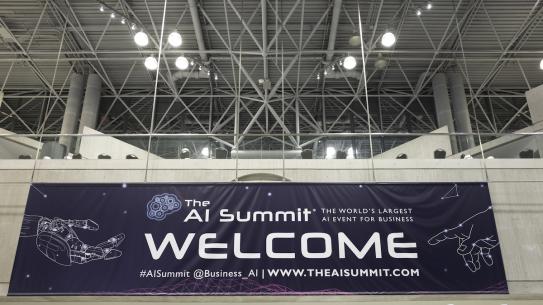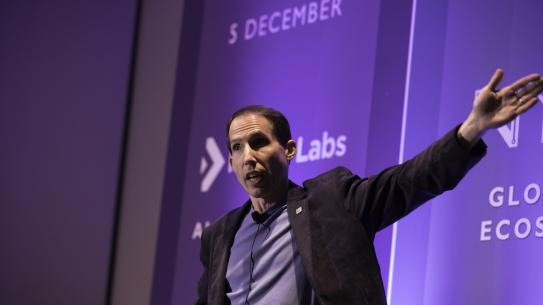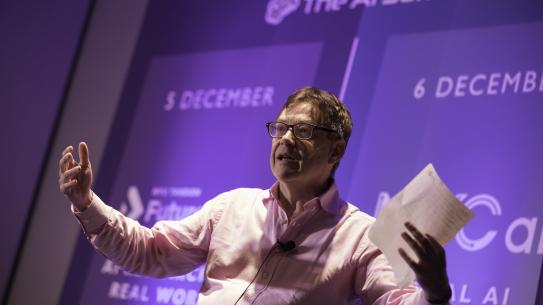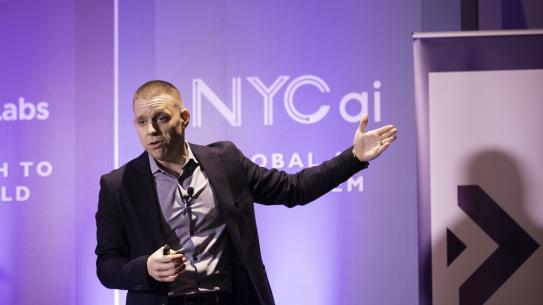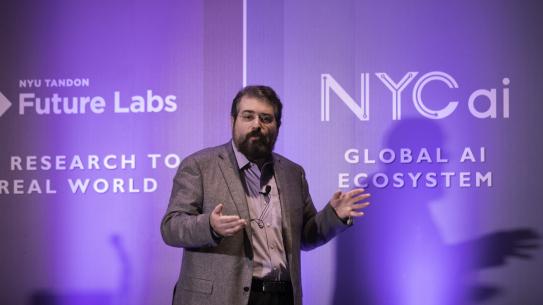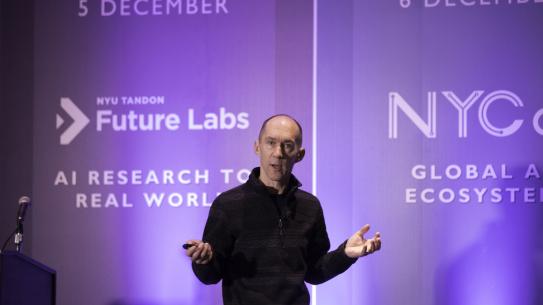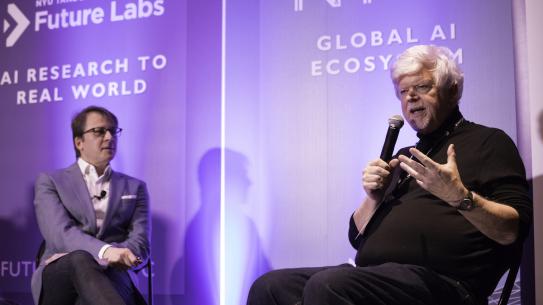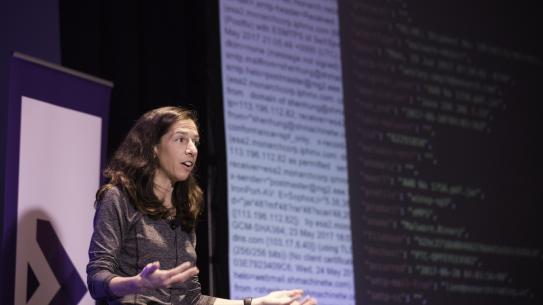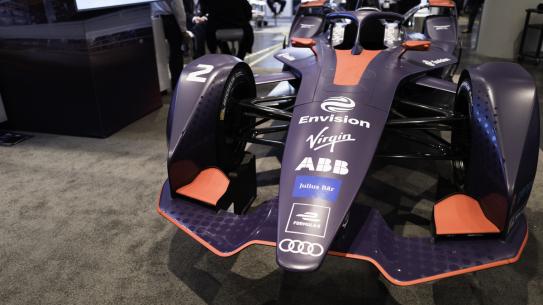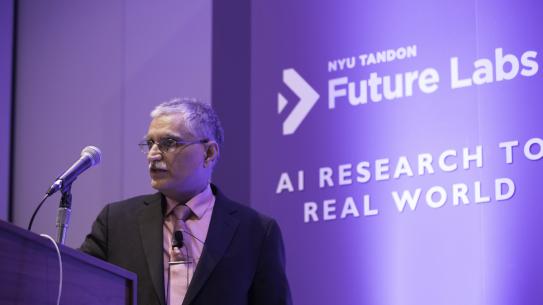Tandon’s Future Labs Partner to Pull Off the World’s Largest AI for Business Summit
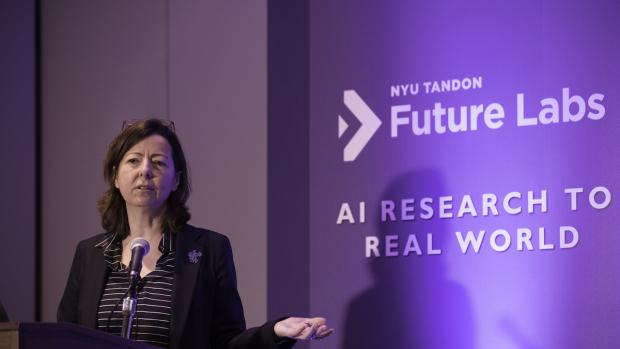
Dean Jelena Kovačević opening the proceedings of the AI Summit © Caroline Sinno Photography LLC
A recent spate of headlines makes it plain: artificial intelligence is transforming the business world, and New York City is feeding the tech talent pipeline that’s helping to make it happen. “Attention, AI Job Seekers, NYC Is the Place to Be,” declared Crain’s; “New York Is the Capital of a Booming Artificial Intelligence Industry,” according to Bloomberg. The time is ripe for a New York City event bringing together industry experts, academic pioneers, and enterprise leaders to discuss the state of the art, the trends, and the research fueling the AI revolution.
To that end, on December 5-6, Tandon’s Future Labs incubator — the largest AI incubator in New York — served as the exclusive research partner of the third annual AI Summit, a massive conference and exhibition held at the Javits Center that focused on the practical implications of AI for enterprise organizations.
Under the leadership of Managing Director Steven Kuyan, the Future Labs curated a day-long program of technology-centered speakers, including start-up founders, researchers, and engineers working at the forefront of the field.
Tandon itself was well-represented: Dean Jelena Kovačević opened the proceedings with a discussion of the confluence of AI and academia. She pointed to speakers at the school’s Modern Artificial Intelligence seminar series, like Yann LeCunn, Facebook’s director of AI research and a member of the NYU faculty; Anima Anandkumar of CalTech, who is also director of machine learning research at computer and AI company Nvidia; and Stefano Soatto, director of the UCLA vision lab as well as director of applied science at Amazon. “They and many others stroll easily between academic research and real-world applications,” she explained. The academic research going on at Tandon, she asserted, “will revolutionize transportation, medical diagnostics, telecommunications, gaming — virtually every area of commerce in products and services for consumers and business — as well as the workplace.”
Academic Superstars
Some of those researchers were on hand as part of the Summit’s line-up, including Daniel Sodickson, whose titles include professor of radiology, professor of neuroscience and physiology, and research vice chair for the Department of Radiology at NYU Medical School; professor of biomedical engineering at NYU Tandon; and director of the Bernard and Irene Schwartz Center for Biomedical Imaging. A seminal figure in the development of parallel magnetic resonance imaging (MRI), which enabled imaging at previously inaccessible speeds, he explained to a standing-room-only audience at the Javits that he is currently using machine learning techniques to make MRI scans even quicker and thus less uncomfortable for patients.
The audience also heard from Keith Ross, whose equally long list of titles includes dean of engineering and computer science at NYU Shanghai, Leonard J. Shustek Professor of Computer Science at NYU, and affiliated faculty member of both the Department of Computer Science at Courant and the NYU Center for Data Science and who spoke about the limits of deep reinforcement learning. During a much-anticipated session on robotics, Professor of Mechanical and Aerospace Engineering Vikram Kapila, who directs Tandon’s Mechatronics Lab, spoke about the intersection of frontier tech (as such cutting-edge fields as AI, the Internet of Things, and mixed reality, are sometimes collectively known) and robotics. He explained as an example that his students are using a mixed reality app on their mobile devices to manipulate multi-robot systems, essentially setting up testbeds out in the real world instead of a lab. Their work might one day be a boon for the disabled, who could use their devices to navigate through a mixed reality version of their homes to direct an assistive robot to complete needed tasks.
Companies on the Cusp
Many of the Summit’s speakers came from established companies like Lyft and Accenture, but startups from the Future Labs also galvanized the audience. As Dean Kovačević pointed out, Tandon’s Future Labs have played a key role in cultivating young companies in the nascent AI sector, and there are already more than 30 current or graduated AI-centered startups in the fold, including such rousing success stories as Carmera, which is focused on urban mapping with real-time, street-level intelligence for autonomous vehicles and which raised $20 million in Series B funding this year, partnered with the NYC DOT on pedestrian analytics, plans to expand to Asia, and took Best in Show and Startup of the Year at the first-ever PlanetM Awards Show.
The Summit audience got to hear from Igor Jablokov, the CEO of Future Labs current portfolio company Pryon, whose talk, “The Human Voice Is Key to Unlocking Business Value from Augmented Intelligence” touched upon the fact that while AI assistants like Alexa and Siri are permeating the consumer marketplace, enterprise is still looking for its “killer app.” (Jablokov’s earlier startup, Yap, was Amazon’s first voice-related acquisition and led to Alexa.) Also speaking was Hilary Prichard, a data scientist at startup Wade & Wendy, who explained how companies could use AI platforms to recruit talent with the help of advanced chatbots.
Other Future Labs-affiliated companies were represented out in the exhibit hall. Chaim Fried, the founder of Owal (a cloud video platform that uses AI to reimagine and enrich surveillance video in residential and commercial buildings, converting previously overlooked video into powerful, interpreted behavioral data), was happily manning his company’s booth in the bustling venue. “I’m here today thanks to NYU and the Future Labs,” he said. “Not just here at this great event, but here as a viable startup thanks to all the support and services we’ve received as a tenant.”
The Future of AI Enterprise
Steve Kuyan admits that current AI systems are far from refined, but he’s confident that with the vision and drive of AI entrepreneurs, coupled with high-caliber academic research, the state of the art will improve by leaps and bounds, and he envisions that it will one day be ubiquitous. He quoted Andrew Ng, founder and CEO of Landing AI and co-founder of Coursera, who said, ““Just as electricity transformed almost everything 100 years ago, today I actually have a hard time thinking of an industry that I don’t think AI will transform in the next several years.”
“Everyone talks about how much impact AI will have on society,” Kuyan added. “But here at the Future Labs stage, we’re talking about how we get there.”


